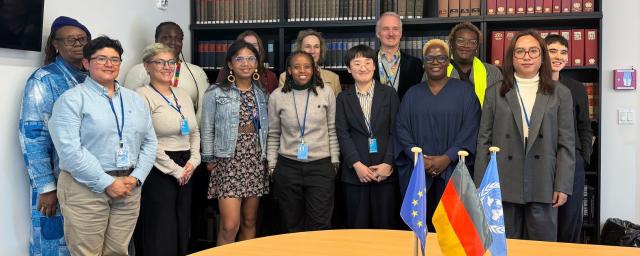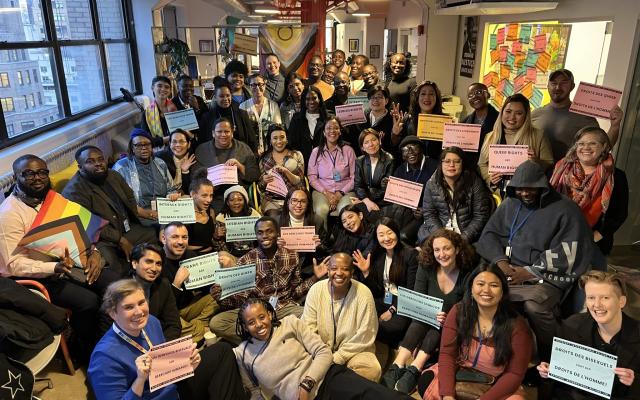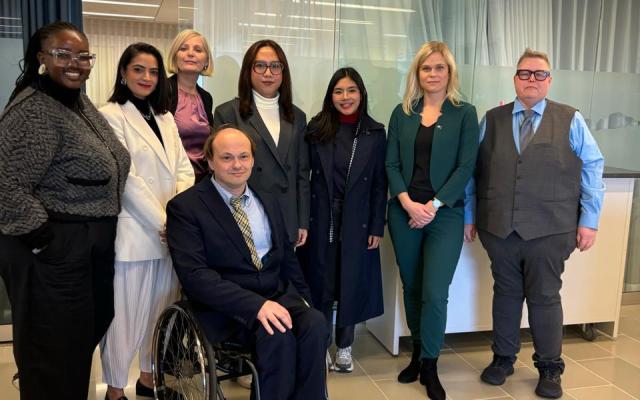
Photo courtesy of Asia Pacific Transgender Network
Engaging with multilateral feminist spaces is often portrayed as a universal good. But for activists from the Global South, especially trans and gender-diverse advocates, these spaces are both a promise and a challenge. They are arenas where voices from marginalized communities can finally be heard, yet they also reflect deep inequalities in power, representation, and access. This blog chronicles Nhuun Yodmuang’s first experience at the Commission on the Status of Women (CSW69) as a trans activist from Asia-Pacific, highlighting the hard-gained opportunities, persistent barriers, and vital coalitions that shape feminist advocacy in global policy spaces. It is a reflection on resilience, visibility, and the ongoing fight to ensure that all voices - not only those from the Global North - count in defining gender equality.
Experience at the Commission on the Status of Women (CSW)
I recently started to actively engage with mainstream women’s rights and feminist spaces, which are new to me and many trans activists from Asia and the Pacific. We are still navigating what these spaces mean for our movements in the region. Earlier this year, I got the opportunity to engage with in-person CSW69 for the first time with the support from The Swedish Federation for Lesbian, Gay, Bisexual, Transgender, Queer and Intersex Rights (RFSL).
For a trans advocate from regional Asia Pacific movements, participating in the biggest inter-governmental, multi-stakeholder, and cross-movements discussion in the world on the rights of women and Gender Equality, like the CSW, is a crucial and hard-gained opportunity to ensure that the representation and voices of trans communities from our region are heard. This is particularly important against the backdrop of the trivialization of trans communities in international consensus and policy discussions, even within multilateral advocacy movements, as well as amid the ongoing rise of anti-trans rhetoric across the world and within spaces such as the United Nations.
As an international law practitioner and member of Asia’s trans communities, I see the importance of including our voices from the region in the implementation of the Beijing Declaration and Platform for Action, the annual CSW Agreed Conclusions and Political Declarations and Sustainable Development Goals which remain the only set of gender equality policies adopted and committed to by all UN Member States-a rare occasion of unanimous agreement. This is an extremely important mechanism to engage with and utilize to advance gender equality in regions like Asia and the Pacific, where civic spaces are shrinking, progress is piecemeal and hard to achieve, and retrogression is widespread. It is even more important in the backdrop of the rising transnational and global anti-trans rhetoric and mobilization.

Photo courtesy of Asia Pacific Transgender Network
Fighting Erasure: Trans Realities in Global Policy Spaces
The trans movement has long hoped for more representation at the CSW-for the words ‘gender identity and expression’ and our lived realities to be reflected in outcome texts, leading to inclusive implementation at the local level across the world. At CSW this year, Asia Pacific Transgender Network (APTN) carried multiple advocacy demands, including the inclusion of the unique lived realities of trans and gender-diverse people from Asia-Pacific countries in discussions and international consensus, stronger leadership and commitments to trans rights from governments (particularly given the shifting landscape of which countries lead on LGBTQIA+ rights globally), and solutions for mitigating and addressing the impacts of anti-trans attacks and systemic transphobic violence, such as the USAID funding cuts.
However, those expectations are far from reality. From the beginning to the end of my CSW engagement journey, the movement struggled to secure even the bare minimum. I learned that outcome documents of the CSW and Political Declarations have not included the word ‘gender identity’ or ‘gender expression,’ and that some governments were even attempting to remove the word ‘gender’ from official CSW documents during negotiations. Despite the growth of trans movements at the CSW, I observed the lack of representation of trans people especially from the Global South, and the tokenistic inclusion of our community in the regions, as well as hesitation from governments to host side events inclusive of trans speakers.
Moreover, against the backdrop of global anti-trans political climates among UN Member States, I observed a drastic shift in countries’ positions-from being willing to lead on advancing LGBTQIA+ rights to openly opposing it. From bilateral meetings with governments, I also saw that ongoing supporters were still navigating this new dynamic, while activists worked hard to secure their continued support and encourage them to step up. Additionally, it was disappointing to note that the increasing number of anti-gender organizations at CSW-through meetings, convenings, and events were allowed space to exist and operate freely.
Unveiling Inequalities: Power, Well-Being, and Global South Exclusion
As an activist from the Global South, my advocacy also recognized the imbalance of power and influence between the Global North and Global South at the CSW. I also saw that discussions-whether hosted by governments or by LGBTQIA+ and feminist organizations still lacked or tokenistically included representation from the Global South and remained centered on Western-centric narratives of gender equality. These often failed to consider inequalities between Global North and Global South countries and ignored the systemic oppression by Western powers in our regions, such as colonialism and neo-liberal capitalism, which fuel conflicts and the climate crisis while Trans and gender-diverse communities, already among the most marginalized, are disproportionately affected by these crises.
Aside from my frustration over the lack of Global South and trans inclusion in CSW spaces, I also want to highlight an often-overlooked aspect: the mental health and well-being of activists in these multilateral spaces. As a trans woman from Thailand, travelling to the US or Europe for UN sessions always feels intimidating. I was even more anxious about the CSW trip this year given the hostile anti-trans climate in the US. This is not only a personal struggle but also a systemic issue faced by activists from the Global South, which prevents meaningful participation in global advocacy spaces.
To attend these discussions, activists from the Global South must invest disproportionate amounts of energy and resources: enduring long and expensive flights that impact health and rest, navigating jet lag and different living conditions, and balancing responsibilities back home with time differences.
This year was especially stressful as I observed an increased number of visa rejections for trans and Global South activists, along with heightened border difficulties. While I was eventually able to attend, this was one of my most stressful advocacy trips. We need to decentralise UN discussions, and I hope to see more multilateral engagements held outside of New York and Geneva.

Photo courtesy of Asia Pacific Transgender Network
Building Bridges: Trans and Global South Voices at the CSW
Despite these struggles and disappointments, I still hold hope for better trans and Global South inclusion at the CSW because of the movement I got to connect. I was able to connect with robust and resilient LGBTQIA+ movement organizers such as RFSL and other organizations from the LGBTI Caucus (RFSL, ILGA World, COC Netherlands, Outright Action International), who continue to do incredible work being eyes and ears in CSW processes for the LGBTQIA+ movements across the world, and bringing activists together in-person and strategize and act collectively with the safe spaces like ‘Lesbian Tent’ provided, and coordinate different official, parallel and even provoking spaces for activists to amplify their regional and local advocacy with governments and stakeholders.
Because of this CSW participation, my connections also expanded to include several like-minded CSOs from intersectional movements, such as the Women’s Rights Caucus, sex worker movements, and Asia Pacific Caucus; these cross-movements building and solidarity are much needed than ever when trans movements needs more support in fighting the rise of our opponents. Even in the most pressing situations, I observed stronger resistance and greater creativity in navigating changes to the activism landscape from these organizers and allies. This, for me, is the beauty of CSW engagement-it encourages me to continue working on the CSW and other multilateral advocacy related to women’s rights and gender equality.
From these experiences, moving forward, APTN will continue not only to strengthen our engagement in CSW discussions but also find ways to connect more deeply with regional CSW processes and government-led local implementation, to ensure real and positive changes in the lives of trans people across the countries in Asia Pacific and the world.
 Nhuun Yodmuang is the Human Rights and Advocacy Manager at the Asia Pacific Transgender Network (APTN). Nhuun, a Thai Trans Activist with a background in International Human Rights Legal Framework, has been organizing movements of trans and gender diverse activists from Asia and the Pacific to engage with multilateral activism and spaces such as the UN Human Rights Council in Geneva and the SDG monitoring processes.
Nhuun Yodmuang is the Human Rights and Advocacy Manager at the Asia Pacific Transgender Network (APTN). Nhuun, a Thai Trans Activist with a background in International Human Rights Legal Framework, has been organizing movements of trans and gender diverse activists from Asia and the Pacific to engage with multilateral activism and spaces such as the UN Human Rights Council in Geneva and the SDG monitoring processes.